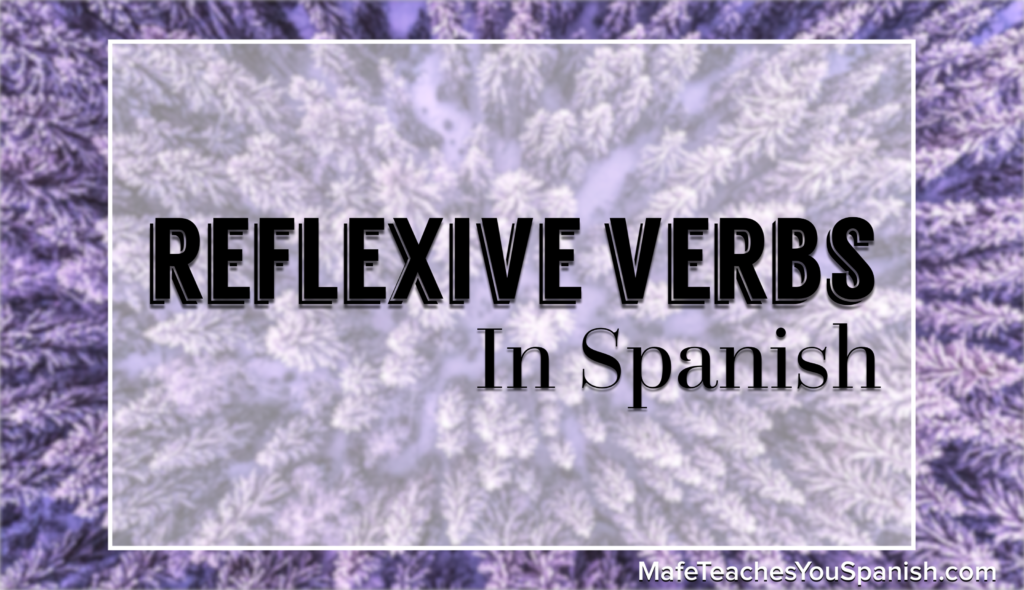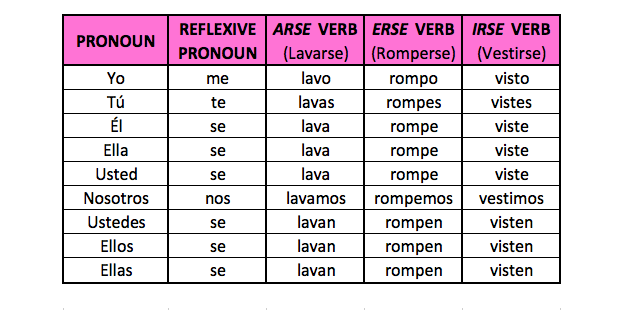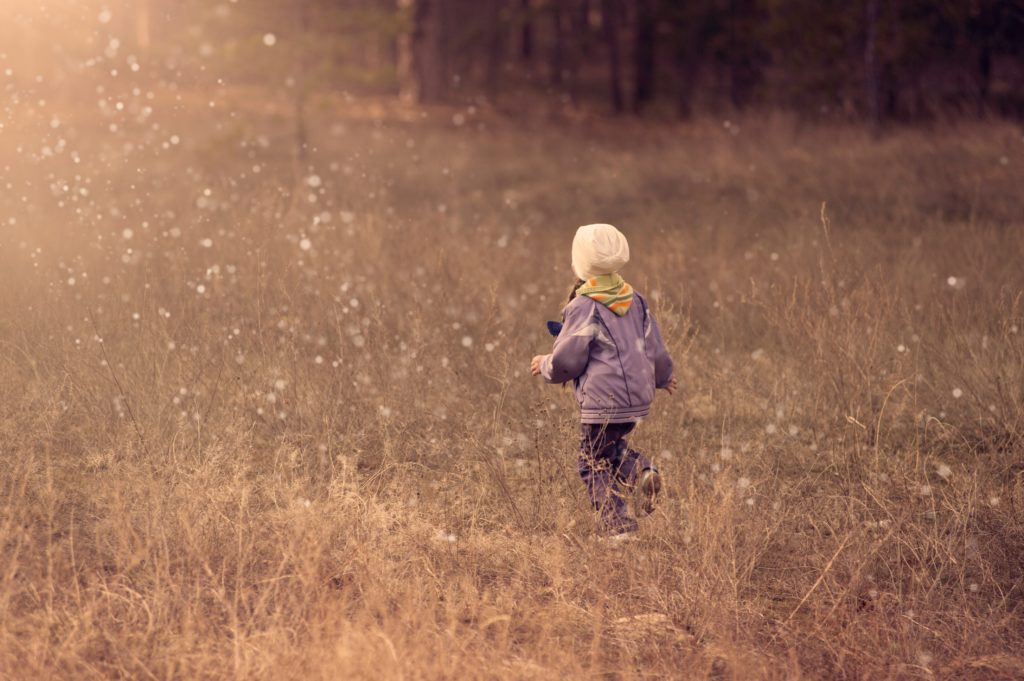
These verbs are very common in Spanish. They reflect an action where the subject and the object are the same, I mean, things that one does to oneself.
For example: when I brush my teeth or my hair, when I shower, when I dress up, when I put my make up on, when I wake up, when I go to bed etc. These are all actions that I do to myself. These verbs are so common in Spanish, that you will see them everywhere and you’ll get used to them very quickly.
Probably the first reflexive verb that you already know, without realizing it is the verb llamarse. You learned it when you were learning how to introduce yourself.
EXAMPLES:
- Yo me llamo Mafe
- Mi mamá se llama Martha
- Ella se llama Andrea
- Él se llama Lucas
To learn these verbs, you only need 2 things.
- The reflexive pronouns
- Practice with the most common reflexive verbs
REFLEXIVE PRONOUNS
These pronouns go after the subject and before the verb.
Yo – me
Tú – te
Usted – se
Él – se
Ella – se
Nosotros – nos
Ustedes – se
Ellos – se
Ellas – se
CONJUGATION REFLEXIVE VERBS IN SPANISH
You will easily recognize reflexive verbs because, in their infinitive form, they end with se. So instead of the usual AR, ER IR verbs you’ll see ARSE, ERSE, IRSE verbs:
Lavar (to wash) becomes lavarse (to wash oneself)
The difference between lavar and lavarse is that lavar is used for an external object
Example: lavar la ropa (to wash the clothes)
While lavarse means that you do it to yourself,
Example: lavarse las manos (to wash one hands)
HOW TO CONJUGATE REFLEXIVE VERBS?
Pronoun + reflexive pronoun + verb conjugated as usual*+ complement
*That means an ARSE verb is conjugated just like an AR verb. The SE part only means that you need to add the reflexive pronoun in front:
Yo + me + lavo + las manos

THE MOST COMMON REFLEXIVE VERBS
BASICS
Actions the subject does to himself:
- despertarse (to wake up)
- levantarse (to get up)
- bañarse (to take a bath)
- ducharse (to shower)
- lavarse (to wash oneself)
- secarse (to dry (oneself, itself)
- cepillarse (to brush)
- maquillarse (to put makeup on)
- mirarse (to look)(at oneself, for example in a mirror)
- peinarse (to comb onself)
- vestirse (to dress up)
- ponerse (la ropa) (to put on (clothes)
- quitarse (la ropa) (to take off (clothes)
- sentarse (to sit down)
- quedarse (to stay)
- acostarse (to lay down)
We can practice these verbs talking about our daily routine
Ejemplo
Yo me despierto todos los días a las 6:30 am, me quedo en la cama un rato y me levanto a las 7am. Me ducho, me seco con mi toalla y me visto. Yo me pongo una blusa blanca y un pantalón azul. Luego me miro en el espejo, me cepillo los dientes me peino y me maquillo. Por la noche me quito la ropa y me pongo la pijama, me siento a ver TV y me acuesto a las 10pm a leer un libro, normalmente me duermo a las 11pm
I wake up every day at 6:30 am, I stay in bed for a while and get up at 7 am. I shower, dry with my towel and get dressed. I put on a white blouse and blue pants. Then I look at myself in the mirror, brush my teeth, comb my hair and put my makeup on. At night I take off my clothes and put on my pajamas, I sit down to watch TV and I go to bed at 10 pm to read a book, I usually fall asleep at 11 pm.

ADVANCED
Some reflexive verbs show things that we do to each other. We use them with nosotros nos
- amarse (to love each other)
- conocerse (to know each other)
- pelearse (to fight with each other)
- abrazarse (to hug each other)
- besarse (to kiss each other)
- casarse (to get married to each other)
Ejemplo
Nosotros nos conocemos desde hace 3 años, nos amamos mucho, nos besamos y siempre nos abrazamos y nunca nos peleamos. El próximo año nos casaremos en mi ciudad.
We have known each other for 3 years, we love each other very much, we always kiss and hug each other and we never fight. Next year we will get married in my city.

Some reflexive verbs show things that happen to us by accident, or things that we do to ourselves by accident. This reflects things that happen to us without an external cause.
- caerse (to fall down) it’s by accident, nothing external pushed me
- confundirse (to get confused)
- olvidarse (to forget)
- perderse (to get lost)
- romperse (to break (something in myself, for example, a bone or a fingernail))
- Enfermarse (to get sick)
El niño se olvida del camino a casa, se pierde en el bosque, se cae a un hueco y se rompe una pierna.
The child forgets the way home, gets lost in the forest, falls into a hole and breaks a leg.

Some reflexive verbs show a change inside your head, I mean, a change in your perception, emotion or sensation:
- acordarse (de) (to remember (about))
- acostumbrarse (a) (to get used (to))
- asegurarse (de) (to make sure (of))
- darse cuenta (de) (to realize)
- enterarse (de) (to find out)
- sentirse (to feel (emotion, illness))
- alegrarse (to become happy)
- enojarse (to get angry)
- entristecerse (to get sad)
Ella se alegra cuando se acuerda de sus hermanos y se da cuenta de que son una buena familia
She becomes happy when she remembers her brothers and realizes that they are a good family

Take a lesson about the PRESENT TENSE IN SPANISH
Having trouble understanding the use of these verbs? Would you like to practice them in real life?
Send me a message to book a lesson now and I will help you to understand, practice and use these verbs and more.
PRACTICE
- Tú y yo (sentirse) _________ cansados.
- Andrea (acostarse) _________ a las 10 de la noche.
- Yo (levantarse) _________ temprano cada mañana.
- Lucas y Maria (amarse) _________.
- Tú siempre (olvidarse) _________ de mi cumpleaños.
- El niño (quitarse) _________ la ropa para dormir.
- Mis amigos (alegrarse) _________ de mis logros.
Practice this song about someone’s daily routine.
These are not ALL the reflexive pronouns, but it is a very good place to start. I will be writing the second part of reflexive verbs in a blog post soon.
ANSWERS: nos sentimos, se acuesta, me levanto, se aman, te olvidas, se quita, se alegran